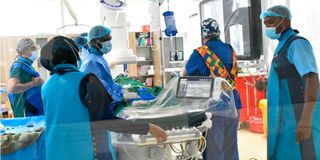Developing story: Iranian President Ebrahim Raisi confirmed dead in chopper crash
Improved cardiac surgery training good for patients

Some of the paediatric-cardiac surgeons and specialists from Italy and Mombasa during a closed heart procedure at the Coast General Teaching and Referral Hospital on July 27, 2021.
What you need to know:
- Kenya requires 100 heart surgeons to deliver adequate services to its population, hence the need to train at least 15 heart surgeons per year, up from the current five.
- According to a World Heart Federation report on Kenya’s cardiac health situation, cardiovascular disease accounted for 13.8 per cent of all deaths in 2019.
A decade ago, disturbing media reports revealed that heart surgery patients had been on a surgical waiting list for up to two years before receiving the life-saving intervention.
The country’s main challenge at the time was a combination of a shortage of heart (cardiothoracic) surgeons and theatre facilities.
While some progress has since been made in both areas, the situation remains dire.
Kenya requires 100 heart surgeons to deliver adequate services to its population, hence the need to train at least 15 heart surgeons per year, up from the current five.
Given the extensive time and knowledge required to train them, as well as the fact that Kenya has not had a local cardiac surgery training programme for a long time, it’s not surprising that Kenya has a scarcity of cardiothoracic surgeons, despite the fact that cardiovascular disease accounts for about 25 per cent of all hospital admissions and is the second leading cause of death after maternal and perinatal deaths, according to the Health ministry.
Further, according to a World Heart Federation report on Kenya’s cardiac health situation, cardiovascular disease accounted for 13.8 per cent of all deaths in 2019.
Cardiac surgeon training
With the increase in demand for cardiovascular disease interventions, including cardiothoracic surgery, there is an urgent need to scale up cardiac surgeon training, and efforts in this direction are commendable.
For example, the University of Nairobi, which has been running a thoracic and cardiovascular surgery programme for the past nine years, can be credited with the country’s ability to produce five locally trained cardiothoracic surgeons yearly.
And recently, Gertrude’s Children’s Hospital announced that it will open the East African Simulation Centre for Cardiovascular Surgery, which will include a skills lab, and is expected to increase the number of surgeons.
Previously, trainees could only learn by operating on live patients and repeating surgeries until they learned something new, but the new centre hopes to shorten the learning curve.
The need for specialisation and enhanced skills is especially evident at children’s hospitals, where, according to reports from earlier this year, a third of paediatric surgery cases are not addressed because of their complexity, forcing families to seek treatment for their children abroad.
Those who cannot afford to fly their children out of the country have to contend with bleak prognoses, most likely death.
Over time, hospitals have steadily improved their ability to detect heart problems early in the hope that patients can seek treatment in a timely manner.
Unfortunately, surgery is the only treatment for many heart diseases, and with the shortage of skilled cardiothoracic surgeons, the wait list is likely to keep growing.
The benefits of the centre are expected to be felt across the region, as the name implies.
Kenya is already in charge of training heart surgeons from other African countries, who have gone on to provide the much-needed expertise in their countries.
Dr Ngwiri, a paediatrician, is the head of clinical services at Gertrude’s Children’s Hospital; [email protected]. Dr Awori, a consultant surgeon at Gertrude’s Hospital, is a senior lecturer of paediatric and congenital cardiovascular surgery at the University of Nairobi; [email protected]





